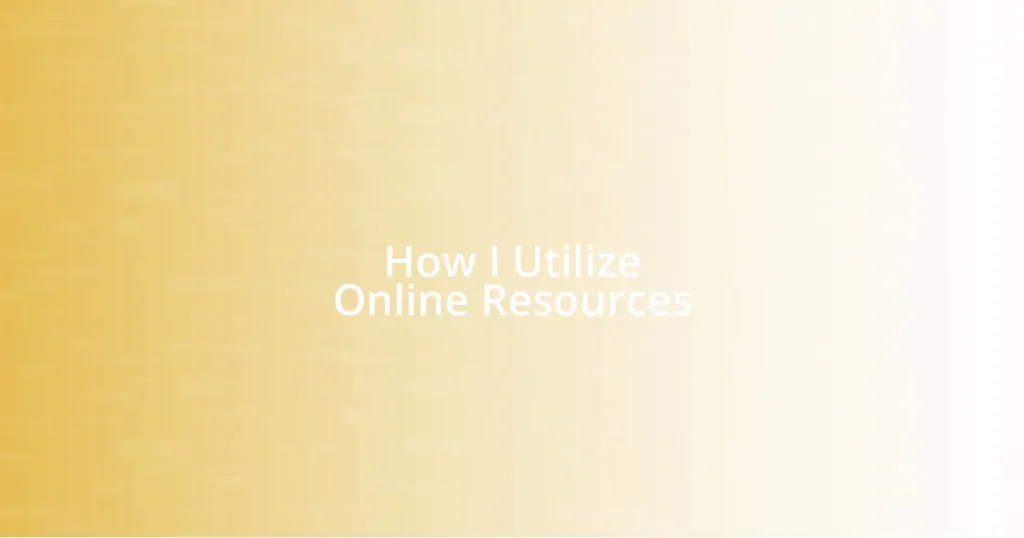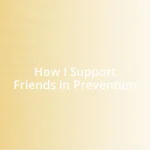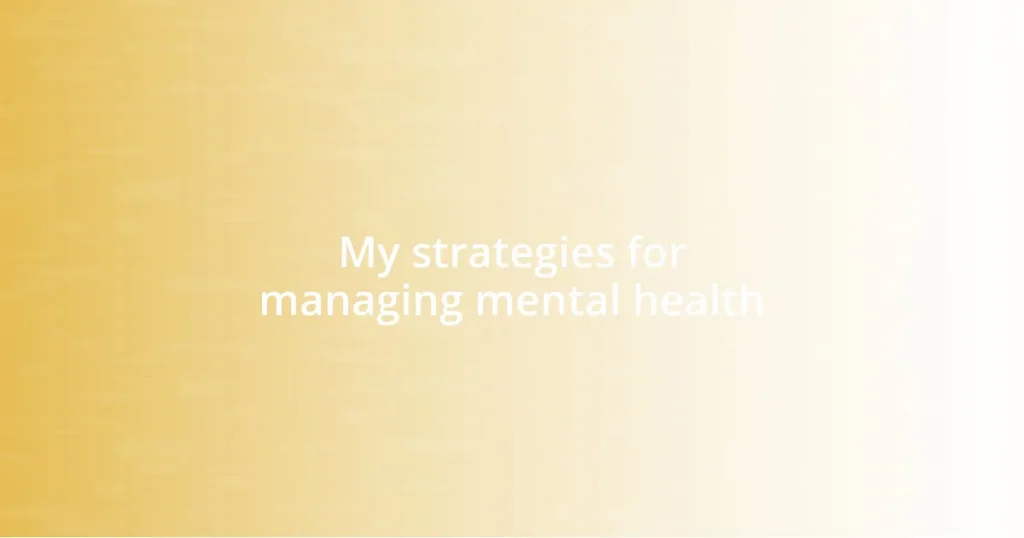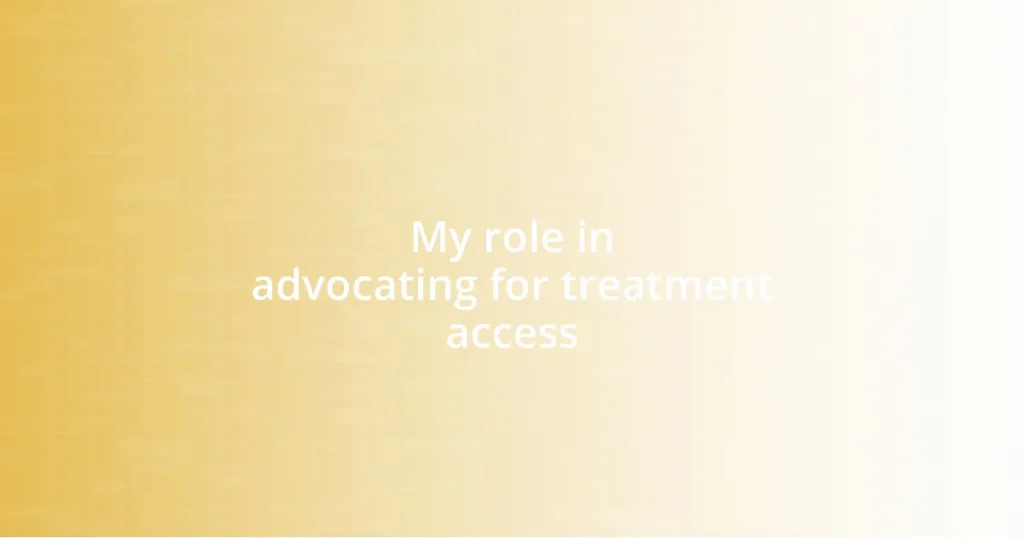Key takeaways:
- Online resources enhance accessibility and provide diverse perspectives, enriching understanding across various subjects.
- Evaluating quality resources involves checking authorship, citations, usability, and user feedback.
- Effective online research strategies include advanced search techniques, organization of findings, and active engagement with material.
- Staying updated with reliable sources through reminders and social media enhances learning and keeps knowledge current.
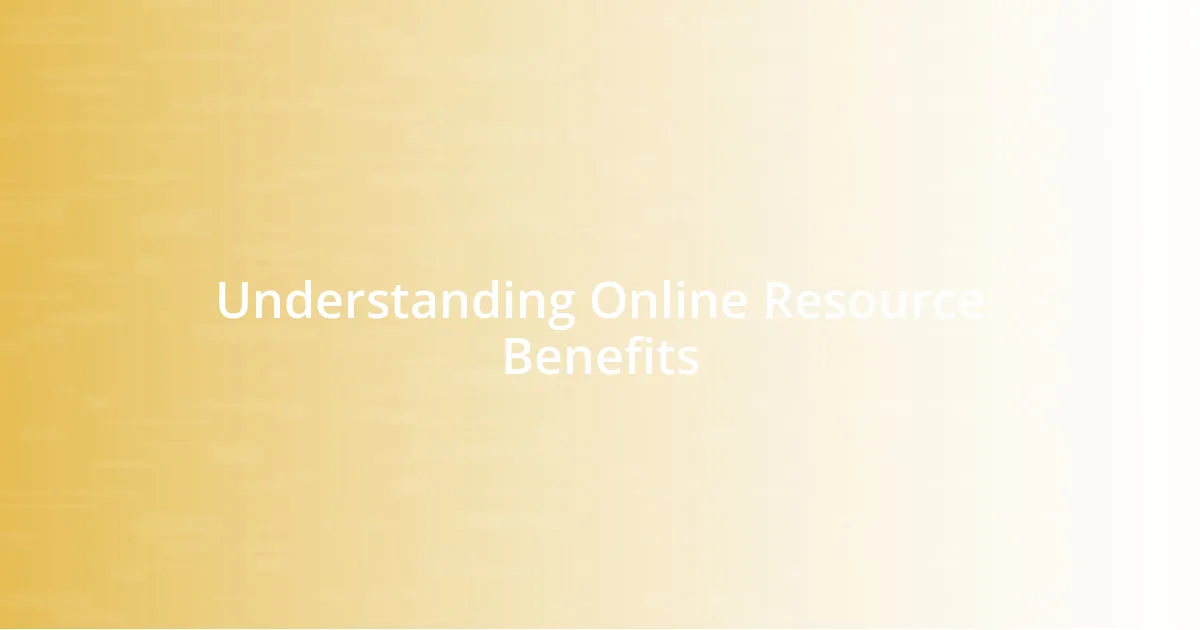
Understanding Online Resource Benefits
I find that one of the standout benefits of online resources is their incredible accessibility. Whenever I need to learn something new, from cooking techniques to complex theories, I simply reach for my laptop or smartphone. It’s empowering to realize that, with just a few clicks, a world of knowledge opens up, isn’t it?
Another advantage I’ve experienced is the variety of perspectives available online. I remember diving into multiple articles and videos when I was preparing for a presentation on climate change. Each resource provided a unique angle that enriched my understanding and made my presentation much more comprehensive. How often do we get the chance to hear from experts across the globe in just one sitting?
Moreover, the interactivity of online resources has transformed how I learn. I must admit that engaging with quizzes and interactive tutorials has made absorbing information feel less like a chore. Have you ever noticed how a little challenge can spark your curiosity? That’s been my experience; the instant feedback and engagement keep me motivated and keen to delve deeper into topics.
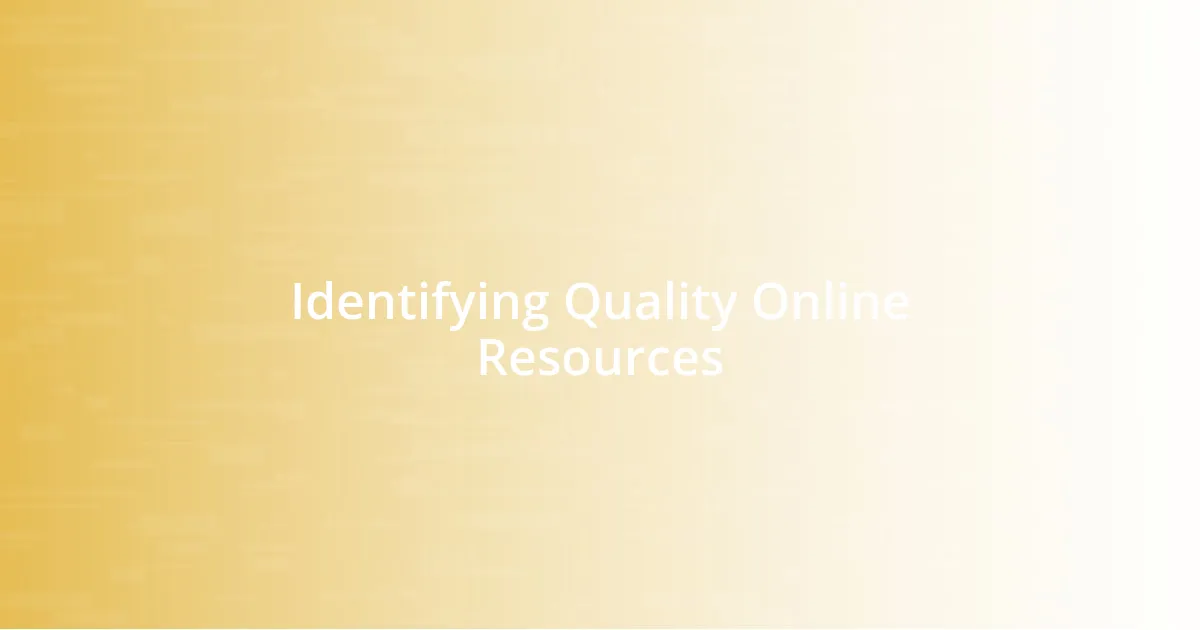
Identifying Quality Online Resources
When it comes to identifying quality online resources, I’ve learned to be discerning. There are countless websites out there, and not all of them stand up to scrutiny. A memorable moment for me was when I stumbled upon a blog that seemed credible at first glance, but a quick check of the author’s background revealed a lack of expertise on the subject. It taught me the importance of verifying credentials and looking for established sources.
Here are some key criteria I consider when evaluating online resources:
- Authorship: Who is behind the content? Check their qualifications and expertise.
- Citations: Reliable resources often cite their information. Look for references to reputable studies or data.
- Design and usability: A well-organized site can indicate a commitment to quality. Trust your instincts; if a site feels cluttered or outdated, it might lack reliable information.
- Reviews and feedback: Look for reviews or user comments. Peer feedback can offer insight into the resource’s reliability.
Finding trustworthy sources can sometimes feel like a treasure hunt, but each layer I peel back enhances my perspective.
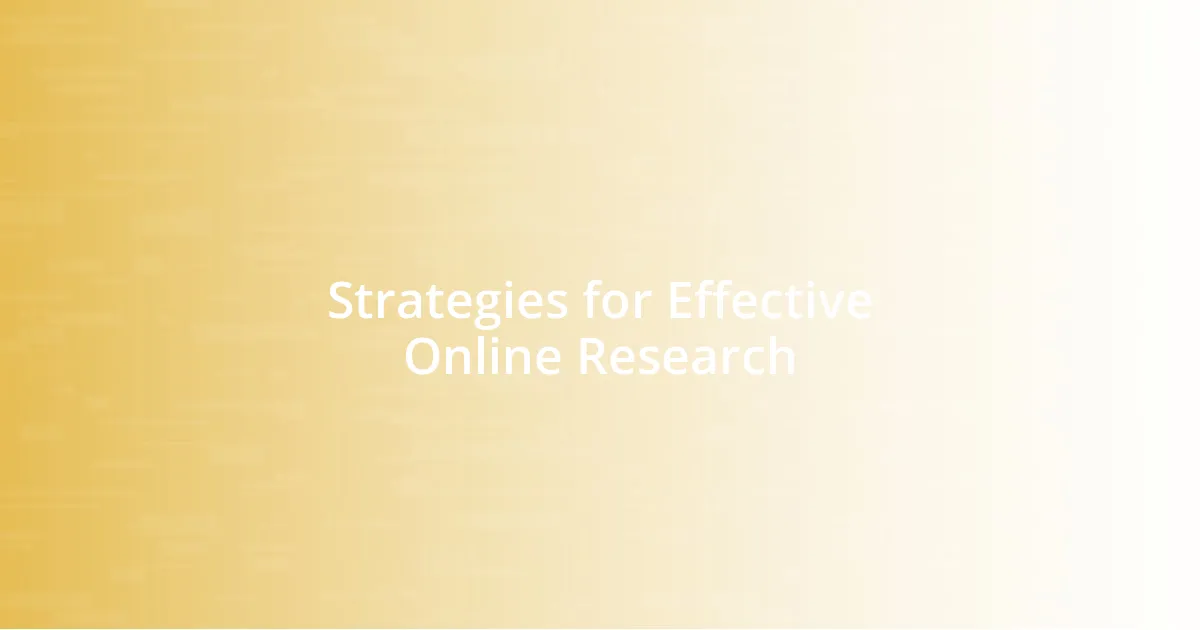
Strategies for Effective Online Research
When conducting effective online research, I’ve found that utilizing advanced search techniques can significantly enhance my results. For instance, using specific keywords combined with quotation marks can narrow down searches to exact phrases, allowing me to find resources that directly address my queries. Have you ever noticed how easy it is to lose focus when there’s a flood of information? Focusing my search this way helps me avoid unnecessary distractions and get straight to the content I need.
Another strategy I embrace is the practice of bookmarking and organizing my findings. I remember when I was deep into a project about renewable energy; I created folders for different topics and saved articles with brief notes about what each resource contained. This method streamlined my research process, making it effortless to revisit information later. Do you ever feel overwhelmed by the amount of information available? Having an organized system not only helps keep my insights neat but also enhances my comprehension.
I also can’t stress enough the value of active engagement with the material. Whenever I read online, I take notes or highlight important points, which cements my understanding of the content. I recall an instance when I tackled a complex subject in psychology; by transforming my notes into a mind map, I was able to visualize connections and deepen my grasp of the topic. Isn’t it fascinating how such a simple act can revolutionize the way we learn?
| Research Strategy | Benefits |
|---|---|
| Advanced Search Techniques | Narrow results and improve relevance |
| Organizing Findings | Enhances retention and efficiency |
| Active Engagement | Deepens comprehension and connections |
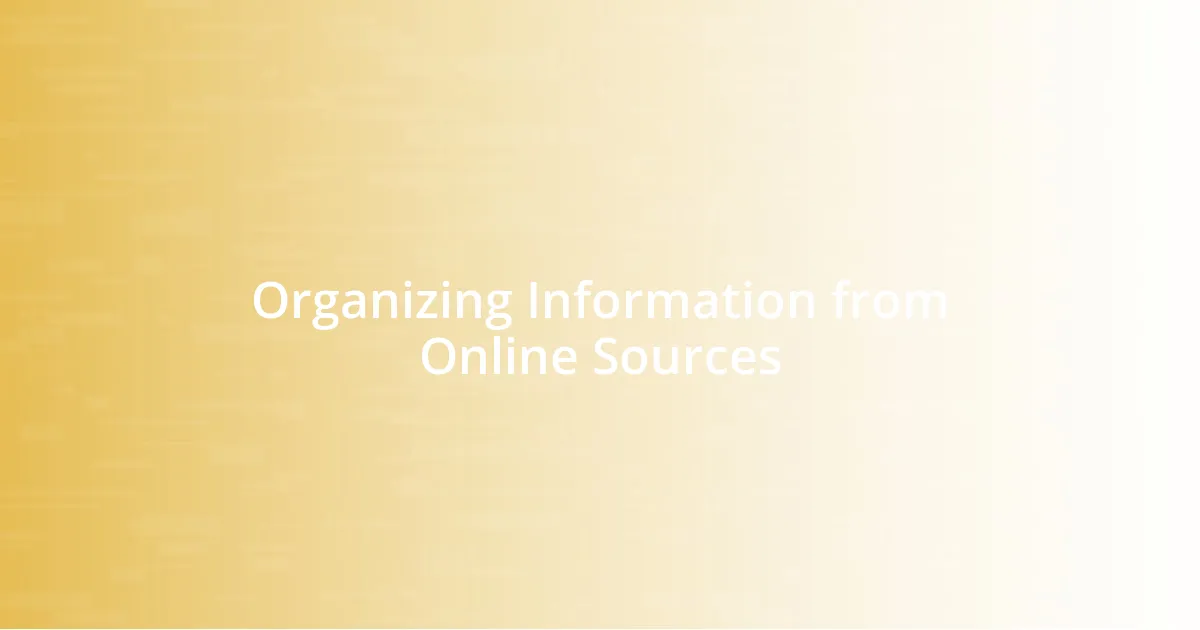
Organizing Information from Online Sources
When it comes to organizing information from online sources, I’ve always felt that creating a system is crucial. For example, I use digital tools like Google Drive and Notion to categorize my findings. I remember when I was researching best practices for remote work; having that structured folder system made it easy to retrieve information quickly when I needed to reference it for projects. Have you ever scrambled to find an article only to realize it’s buried under a mountain of bookmarks?
Another method I’ve found immensely helpful is color coding my notes or documents. I distinctly recall working on a presentation about social media marketing; I assigned colors to different platforms and strategies, which instantly made it easier to discern patterns and trends. This visual aspect not only makes the process enjoyable but also engages my brain in a different way. Don’t you think it’s fascinating how the brain can respond to colors and visual cues?
I often find that summarizing my research in bullet points helps encapsulate the key ideas. I used this technique recently when studying artificial intelligence; turning complex concepts into concise summaries allowed me to grasp the essentials without getting lost in jargon. By making the information digestible, it feels less overwhelming and more approachable. Sometimes, I wonder if we overcomplicate information when simplicity can facilitate understanding.
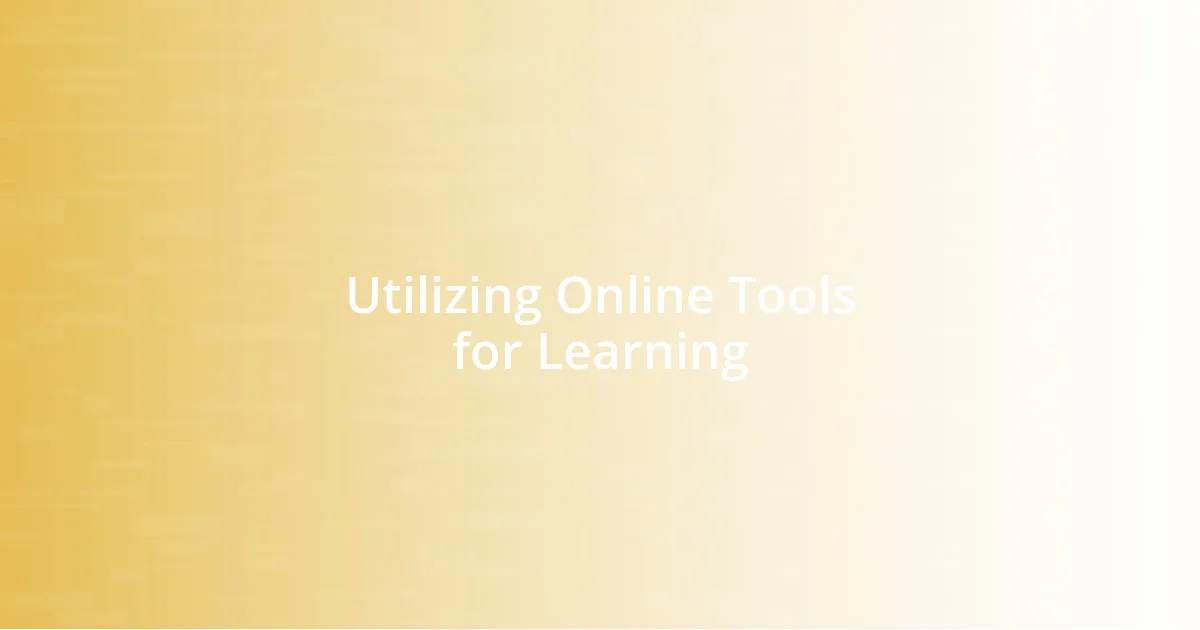
Utilizing Online Tools for Learning
Utilizing online tools for learning has opened up a world of possibilities for me. I’ve been relying heavily on platforms like Khan Academy and Coursera, where I can find structured courses that cater to my interests. There was a time when I wanted to learn about graphic design, and taking a course online not only provided me with valuable content but also connected me with fellow learners who shared my passion. Have you experienced the sense of community that comes from learning with others, even if it’s virtually?
One tool that I’ve grown to appreciate is the use of educational apps, particularly for language learning, such as Duolingo. I remember starting my journey in Spanish just for fun during my commute. The gamified approach kept my motivation high, and I often found myself practicing during unexpected pockets of time—which was completely transformative for my daily routine. Isn’t it incredible how convenient it is to learn something new in just a few minutes a day?
I’ve also found that video tutorials on platforms like YouTube can serve as fantastic supplements to traditional learning methods. I vividly recall a time when I faced a roadblock while attempting to code a simple app; a quick search led me to a tutorial that clarified my confusion in less than ten minutes. The combination of visual learning and practical examples can sometimes bridge the gap between theory and application. It’s moments like these that make me wonder how much easier we can make learning through readily available resources.
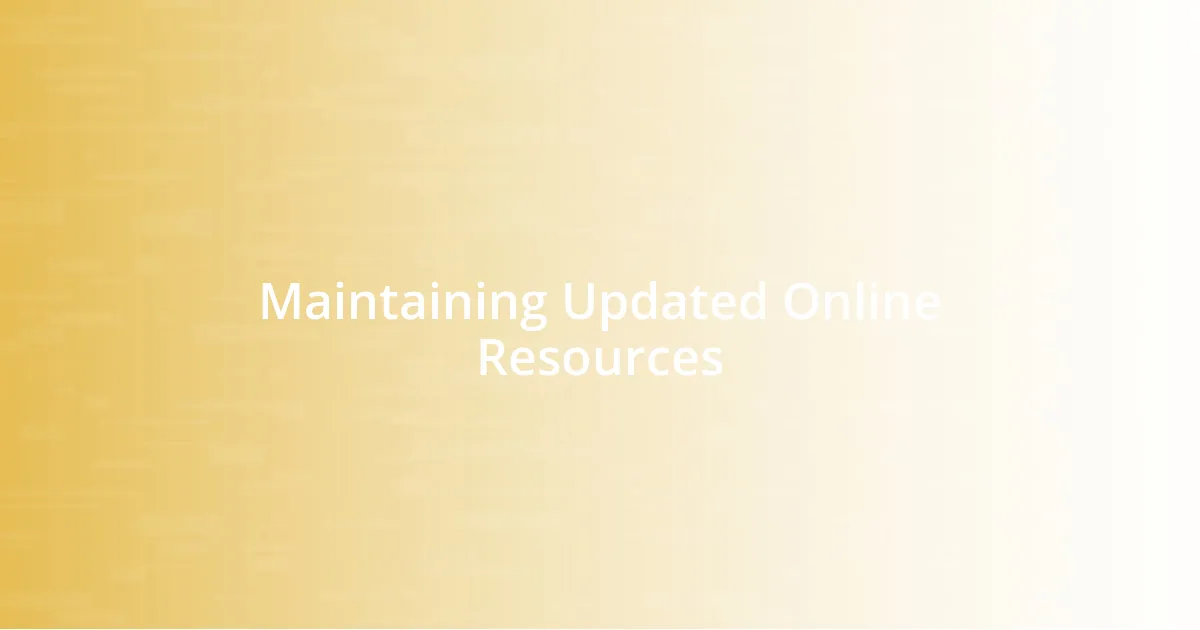
Maintaining Updated Online Resources
Maintaining updated online resources is essential in today’s fast-paced digital world. I make it a point to frequently revisit my go-to websites and subscriptions. Just last month, while I was re-evaluating my sources for a research project, I discovered that one of my trusted blogs had released a new article that completely reshaped my approach. Doesn’t it feel satisfying when you find fresh insights that propel your work forward?
In my experience, setting reminders to check for updates can work wonders. I’ve started using calendar notifications for key websites and newsletters. For instance, I have a reminder to explore industry news every Tuesday and Thursday. I remember when I missed an important update on a platform I used extensively—it felt like being a step behind, and I vowed never to let that happen again. Wouldn’t it be more fulfilling to stay ahead, rather than constantly playing catch-up?
I also leverage social media to follow industry leaders and trending topics. By keeping my Twitter feed updated with these voices, I can quickly gather new information and perspectives. Just the other week, I stumbled upon a thread discussing emerging tools in my field, which led me to resources I hadn’t considered before. It’s remarkable how a simple scroll can ignite new ideas, don’t you think?
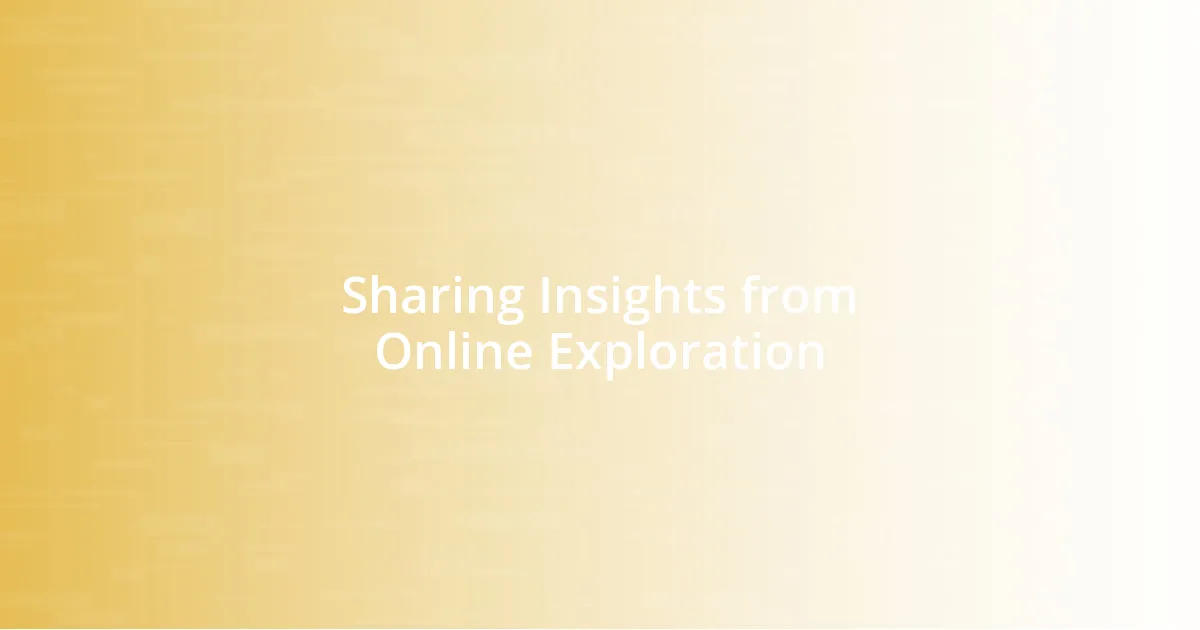
Sharing Insights from Online Exploration
Exploring online resources often leads to unexpected gems that can enhance my understanding of various subjects. I recall sifting through podcasts while cooking dinner, and I stumbled upon a series discussing the latest in artificial intelligence. The passion of the hosts and the insights they shared ignited my curiosity, prompting me to dive deeper into AI applications. Have you ever had a casual moment turn into a profound new interest?
I often find that blogs offer personal stories alongside practical advice, making the learning process feel more relatable. Not long ago, I came across a blog post where the author detailed their struggles with project management. Their candidness resonated with my own challenges, and their solutions inspired me to adopt new strategies in my workflow. Isn’t it amazing how sharing personal experiences can provide lightbulb moments for others?
Engaging with various online forums can unveil diverse perspectives that reshape my thinking. I remember participating in a discussion about sustainable practices in business on Reddit, where someone shared a stunning case study that I hadn’t encountered before. The dialogue was refreshing, and it spurred me to rethink my approach to sustainability in my projects. How often do we overlook the value of community learning in our digital explorations?










